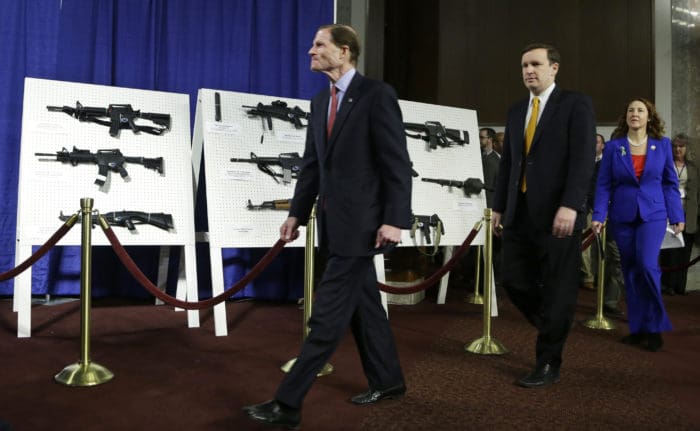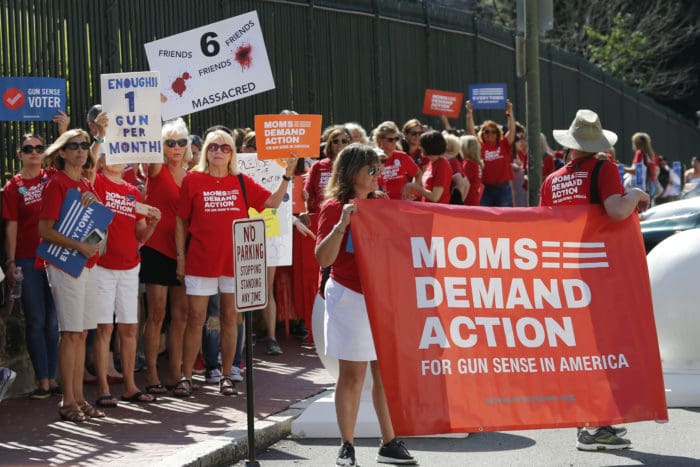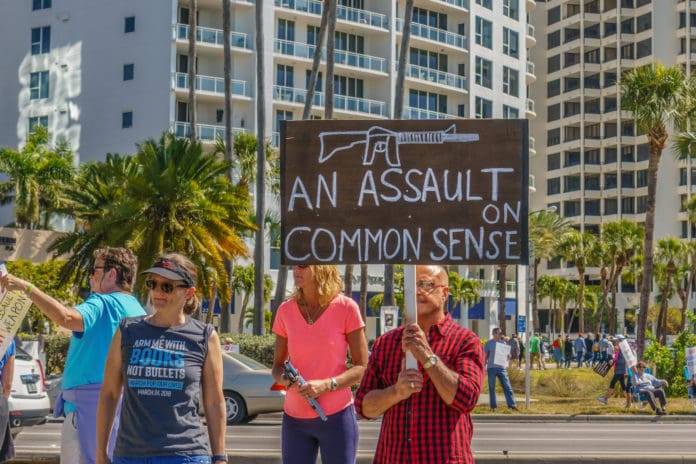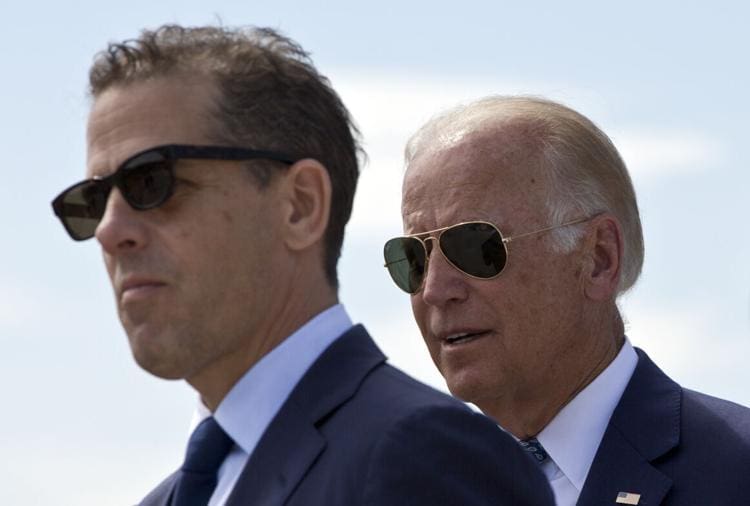Gun control fails quickly in Congress after each mass shooting, but states often act – including to loosen gun laws
By Christopher Poliquin, University of California, Los Angeles
Recent mass shootings at three spas in Atlanta, Georgia and a supermarket in Boulder, Colorado have renewed calls for new gun legislation.
The U.S. has been here before – after shootings in Tucson, Aurora, Newtown, Charleston, Roseburg, San Bernardino, Orlando, Las Vegas, Parkland, El Paso and other communities across the United States.
Congress has declined to pass significant new gun legislation after dozens of shootings, including shootings that occurred during periods like this one, with Democrats controlling the House of Representatives, Senate and presidency.
This response may seem puzzling given that national opinion polls reveal extensive support for several gun control policies, including expanding background checks and banning assault weapons.
But polls do not determine policy. Stricter gun laws are more popular among Democrats than Republicans, and major new legislation would likely need votes from at least 10 Republican senators. Many of these senators represent constituencies opposed to gun control. Despite national polls showing majority support for an assault weapons ban, not one of the 30 states with a Republican-controlled legislature has such a policy. The absence of strict control policies in Republican-controlled states shows that senators crossing party lines to support gun control would be out of step with the views of voters whose support they need to win elections.
But, a lack of action from Congress doesn’t mean gun laws are stagnant after mass shootings.
I am a professor of strategy at UCLA and have researched gun policy. With my co-authors at Harvard University, I’ve studied how gun laws change following mass shootings.
Our research on this topic finds there is legislative activity following these tragedies, but at the state level.

Restrictions loosened
To examine how policy changes, we assembled data on shootings and gun legislation in the 50 states between 1990 and 2014. Overall, we identified more than 20,000 firearm bills and nearly 3,200 enacted laws. Some of these loosened gun restrictions; others tightened them; and still others did neither or both – that is, tightened in some dimensions but loosened in others.
We then compared gun laws before and after mass shootings in states where mass shootings occurred, relative to all other states.
Contrary to the view that nothing changes, state legislatures consider 15% more firearm bills the year after a mass shooting. Deadlier shootings – which receive more media attention – have larger effects.
In fact, mass shootings have a greater influence on lawmakers than other homicides even though they account for less than 1% of gun deaths in the United States.
As impressive as this 15% increase in gun bills may sound, gun legislation can reduce gun violence only if it becomes law. And when it comes to enacting these bills into law, our research found that mass shootings do not regularly cause lawmakers to tighten gun restrictions.
In fact, we found the opposite; Republican state legislatures pass significantly more gun laws that loosen restrictions on firearms after mass shootings.
That’s not to say Democrats never tighten gun laws – there are prominent examples of Democratic-controlled states passing new legislation following mass shootings.
California, for example, enacted several new gun laws following a 2015 mass shooting in San Bernardino. Our research shows, however, that Democrats don’t tighten gun laws more than usual following mass shootings.

Ideology governs response
The contrasting response from Democrats and Republicans is indicative of different philosophies regarding the causes of gun violence and the best ways to reduce deaths.
While Democrats tend to view environmental factors as contributing to violence, Republicans are more likely to blame the individual shooters. Politicians favoring looser restrictions on guns following mass shootings frequently argue that more people carrying guns would allow law-abiding citizens to stop perpetrators.
In fact, gun sales often surge after mass shootings, in part because people fear being victimized.
Democrats, in contrast, typically focus more on trying to solve policy and societal problems that contribute to gun violence.
For both sides, mass shootings are an opportunity to propose bills consistent with their ideology.
Since we wrote our study of gun legislation following mass shootings, which covered the period through 2014, several additional tragedies have energized the gun control movement that emerged following the December 2012 shooting at Sandy Hook Elementary School in Connecticut. Student activism following the 2018 shooting at Marjory Stoneman Douglas High School in Parkland, Florida, did not result in congressional action but led several states to pass new gun control laws.
With more funding and better organization, this new movement is better positioned than prior gun control movements to advocate for stricter gun policies following mass shootings. But with states historically more active than Congress on the issue of guns, both advocates and opponents of new restrictions should look beyond Washington, D.C., for action on gun policy.![]()
Christopher Poliquin, Assistant Professor of Strategy, University of California, Los Angeles
This article is republished from The Conversation under a Creative Commons license. Read the original article.





Where will those pompous pasty mouth busy body Gun Control Zealots be to help should you and yours be cornered by a criminal? The answer is where pompous pasty mouth busy body Gun Control Zealots always are…NOWHERE.
I’ll tell you where they’ll be: right behind the criminals, pushing them in our direction and telling us it’s our fault we’re being attacked.
Yep, Debbie. Agreed, absolutely.
And, coming from a female your statements have even greater impact on readers.
YOU GO GIRL! Keep up the good work.
LETS DO IT ! JUST DO IT ? BAN ALL : AR , AK47 , RIFLES FROM THE STREET .
GOING TO RANGE OR HUNTING , BE IN GUN CASE .
NOW ~ HOW : TO BAN CRAZIES FROM THE STREET . BAN THE ACTIVE CRAZIE SHOOTER
~ BAN FROM THA STREET . NOW ~ HOW ?
LAW BIDING CITIZENS ARM YOUR SELF . LTC , CCW . DO IT , NOW ~ THATS HOW .
You’re not helping.
A law that requires rifles to be transported in gun cases and only used at “approved” ranges isn’t going to help. It would only impose a superfluous restriction on people who were never a problem to begin with. People don’t tend to wander the streets waving long guns of any kind around, anyway.
Any murderous psycho who is determined to find a deadly weapon is going to get one, and it doesn’t take an “assault weapon” or even a gun to kill a lot of innocent people.
So more good people carrying is a good step, as you suggest — mass murderers can be “banned” permanently by armed citizens one by one, wherever they pop up.
That’s not a bad idea NTexas, might add it’s okay loaded and in your car.
I can see where a long gunm would stick out more in a crowd(under a coat?) or walking down a street , you’d know something was up. That idea has some of good.
However that is still an infringement on a Bill of Rights that plainly states, ” Shall Not Be Infringed “.
Chipping at the rock until its washed down the creek and gone forever.
Just another thought…I found the researcher’s conclusions both very interesting and pretty close to what I’d thought about gun control wrangling for several years. I just don’t have their credentials / authority or their podium.
Nice work, folks.
I think many who, like me, were impressed with the article probably feel the same way.
“gun legislation can reduce gun violence only if it becomes law.” – also needs to be a law that actually addresses the violence, rather than just making more hassles for the law-abiding.
There’s the next study that they’ll never do. How much to gun control laws they imply the want implemented actually reduce violent crime. Key word here; violent crime. I will be thoroughly unimpressed by any study which tells me that gun control reduces gun crime, because that’s a given. What they don’t tell you is gun control has never shown any reduction in crime, either conclusively or even conjecturally, because they just move on to other methods.
Oregon is poised to make it a felony to concealed carry (with a license) almost everywhere there is a school or public building including having a gun locked in your car parked in a lot or on the street. It’s SB554 and it’s already passed the Senate and will pass in the House and be signed by the Governor. They have also introduced a bill HB3005 to eliminate the state preemption law as pertains to firearms laws which will allow any county or municipality to create their own firearms laws. Imagine, you would have to know what the law is in each to avoid violation. Depending on where you lived you might no be able to drive more than a few miles without being in violation. These two laws alone will successfully negate concealed carry of a firearm in Oregon
I predict a *lot* of lawbreaking.
Also, this is why you NEVER vote for Democrats. Never, not ever, at any level, not even for assistant dogcatcher. Get enough of them together, and they’ll do this kind of thing every time.
Well I’d vote Democrat dog catcher if every stray dog was a rabid rottweiler.
Not even then.
Unless you want more rabid Rottweilers, PLUS lectures about how possum privilege and systemic marsupialism are the real reasons why rabid dogs are chowing down on your family. If that’s the case, go ahead. 🙂
Keep up the pressure on R senators! Do NOT let up.
More blah blah from an “expert.”
Rarity of “mass shootings” (whatever that means) is irrelevant. It is the fact that: a) they happen at all; b) they happen in places where “good people” visit and congregate; c) they make “good people” feel unsafe for just being somewhere; d) everyone looks the same, and one of them might be on the lip of the cliff, waiting for a mosquito bite to make them “snap” and start shooting; e) it is unfair, uncaring, mean-spirited, inequitable, deadly privilege, and maybe even rayCIS..
Bottome line: no civilized society permits “good” people to be terrorized by crimes committed with a firearm. If a single person is not safe, no one is safe.
Oh yeah: “If it saves just one”.
Forget the gunms, its Deep Woods Off that will prevent mass shootings.
Scientific proof that knees jerk when headlines are made?
So eight people are considered a mass. Thank goodness that clears up the five loaves and two fishes story.
Thank you to the Never Trump folks for bringing this to us.
“Forget the gunms, its Deep Woods Off that will prevent mass shootings.”
+1
Comments are closed.